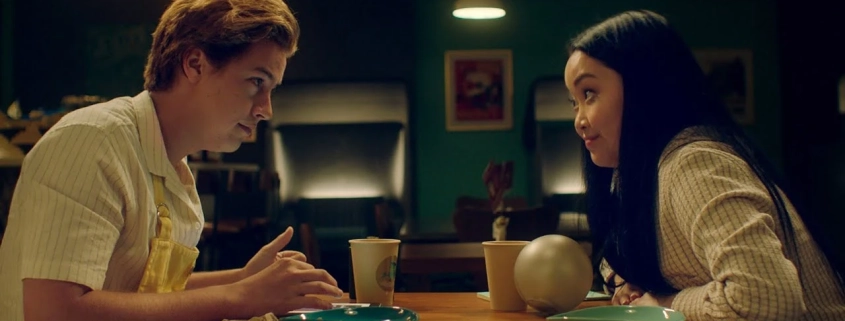‘Moonshot’ promises the universe

This review contains spoilers.
It has been said that humans are born with only two basic fears: falling and loud noises. But, as Warner Bros.’ newest celestial rom-com “Moonshot,” released March 31, suggests, there may be a third fear to consider: loneliness.
Stories help everyone feel a little less alone in the universe. “Moonshot,” directed by Christopher Winterbauer, tells the story of two college-age students who are willing to traverse the cosmos for human connection.
The year is 2049, and Walt (Cole Sprouse) has made it his sole mission to be accepted to Kovi Industries’ Student Mars Program. With 36 rejections to his name and an impending graduation date, Walt realizes that this may be his final opportunity to find where he fits in the universe. Meanwhile, Sophie (Lana Condor) is busy missing her long-term boyfriend Calvin (Mason Gooding) after he takes a job out of town — way out of town. As a published scientist, Calvin is posted on Mars for eight months, and Sophie feels as though the only person who understands her is 55 million miles away.
When Walt crosses paths with the alluring Ginny (Emily Rudd) at a college party, he becomes convinced that he’s found the one. The two spend a “Before Sunrise”-esque night together, which concludes with Walt learning that Ginny will be moving the following day — to Mars. Desperate to maintain a connection with her, Walt sets off in search of a way to fly to the fiery planet. When he learns that Sophie can afford a ticket — not to mention the fact that her boyfriend is stationed on Mars — Walt convinces her to pay up and proceeds to sneak onboard the ship. Thus begins this elaborate out-of-this-world escapade.
The primary reason why the film is such a pleasure to watch is because of Condor and Sprouse’s performances. While the chemistry isn’t always there, the charm is never lacking. When asked about his approach to playing Walt in a roundtable event for college students hosted on March 24, Sprouse took the “Moonshot” approach by fusing sardonicism and sincerity.
“I think, for me, I wanted Walt to feel super approachable, and I’ve been going so ‘My Chemical Romance’ with my emo dark hair on Riverdale for the last 16 years that I … I wanted him to feel like your kind of old best friend, the really annoying guy that used to hang around, like, the edge of the group, so I just shadowed my brother [Dylan Sprouse] for a while,” Sprouse said.
Condor also admitted that she modeled Sophie’s character after someone she knew well: her mom. As a bonafide type-A personality who loves a plan, Condor studied her mother’s idiosyncrasies to help her get into character. Sophie’s obsessive nature provides a nice and satisfying balance to Walt’s impulsive and spur-of-the-moment antics, resulting in a film that feels like a hilarious buddy-cop comedy with a romantic twist.
Similar to an incredibly tailored spacesuit, Sprouse and Condor actually appear to fit the ages of their college-aged characters. The decision to set the film in college allows Walt and Sophie to exercise a greater degree of independence than they realistically would in high school. In spite of this, both characters prove that they have a great deal left to learn.
Oftentimes, the film’s central duo feels as though they are shooting for a sky of unattainable stars. As if what they desire most in this world — to belong to something bigger than themselves — is just out of reach. It is in this way that the film captures the typical college experience, the primary difference being the planetary backdrop.
There is a particularly poignant moment close to the beginning of the film when Ginny quotes Mars enthusiast and astronomer Sarah Stewart Johnson’s 2020 novel “The Sirens of Mars: Searching for Life on Another World” to Walt.
“We have seen in Mars a utopia. A wilderness. A sanctuary. An oracle … without data that could be used to cabin our inquiry or limit our imagination, Mars has been a blank canvas. And tenderly, our human seeking has rushed to fill it,” Ginny said.
If life is the careful art of joyful interrogation, then “Moonshot” is brimming with joie de vivre. The film’s characters are, rather reasonably, questioning themselves, their places in the universe, and their purposes on this planet (and those that lie beyond). It is a testament to the singular nature of the human experience — to the vast, glowing, empty page that we call life.
As the film blatantly suggests, we are the light for each other amidst the loneliness. By forging meaningful relationships with others, we can create energy where there once was none.
Ultimately, “Moonshot” is a lighthearted love letter to the spirit of adventure, and a testament to the undeniable power of human connection. It is proof that planetary pilgrimages — however predictable or laden with tropes they may be — can make for wonderfully enjoyable entertainment, should you be willing to forgo all fear and explore what lies beyond.

